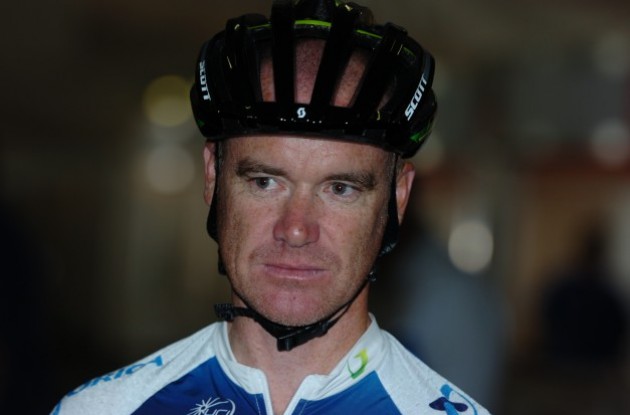Life's Not Fair
So how is the doping “zero tolerance” policy working out? This is a rhetorical question as we’ve seen recently that this type of enforcement is a failure.
Last week the French Senate released a list naming the riders whose 1998 Tour de France test samples came up positive for EPO. Some of you may be wondering why it took 15 years to test these samples from a select group of racers during the 1998 Tour. In ’98 there was no test for EPO and they have been stored in a French lab collecting dust on a shelf like a fine wine in a French wine cellar.
The samples were uncorked and before the results could be published Stuart O’Grady stepped forward and retired saying he doped before the ‘98 Tour started. However, according to the published list O’Grady’s glow-time was during stage 14 of the 1998 Tour – whoops ...
If he was telling the truth about taking EPO two weeks prior to the start of the Tour he would have come up hot before stage 14. Instead O’Grady has joined “The Group of Still Dishonest Riders.”
His excuse is right up there with “I only did it once” and “that just happened to be the time you caught me.” It doesn’t fool your parents and it doesn’t fool us.
In the couple of days following his sudden retirement, O’Grady has had to face some serious backlash.
Australian Olympic Committee (AOC) spokesman Mike Tancred said, “He won’t be remembered as a fantastic competitor that we all thought he was. Instead he’ll be remembered as an athlete who succumbed to the temptation of drugs in sport just to get an edge on his fellow riders.”
The AOC told O’Grady to quit or he would be fired from the Athlete’s Commission. There’s also the possibility he might lose his Olympic medals from the 1992, 1996, and 2004 games. People are also questioning O’Grady’s Paris-Roubaix victory in 2007.
Of course the Australian sprinter wasn’t the only name on the list. Another sprinter, Erik Zabel of Germany, also made the list and like O’Grady he lied about his past doping history.
Zabel admitted to doping prior to the list’s publication - however he says he doped, only once, back in 1996. At the time of this confession he said that he stopped after that one time because he didn’t like the side effects. Those side effects must also include the loss of memory because the French senate list showed he was still doping two years later in 1998.
Therefore, Zabel has had to come out and re-tell his doping story. Yes he had doped throughout much of his career and he deeply regrets doing so.
Like O’Grady, Zabel has lost some key positions, including his seat at the Professional Cycling Council (CCP) and his job as technical advisor for the Cyclassics WorldTour race in Hamburg. Presently he is still pulling a paycheck from Russian Team Katusha as their sprint coach.
The problem is once you lie, then get caught in the lie, and then tell another lie to try and cover up the first lie, no one believes you. Would any rational person think that O’Grady only tried it once and never again? You know you don’t.
To clean up cycling do we need to completely “clean house” and show zero leniency to those who have a dirty past? Is a truth and reconciliation period the way to draw a line in the sand and allow us to put the past behind us?
As with a lot of problems there’s no one way to solve it. Looking at O’Grady’s situation what did he have to gain by admitting before the French senate list became public that he was dirty? Nothing! If he had copped to his past doping infractions he still would have lost his position with the AOC and his reputation still would have taken a hit. Maybe he would even have been fired from the Orica-GreenEDGE team. Basically the same would have happened to Zabel. Instead they rode the wave of their tainted professional victories until it crashed to shore. But before the crash, they earned Classic wins and Tour de France green jerseys, along with the cash bonuses that went along with them. There’s no way anyone can take away the money and past glory from either of them.
So is a truth-and-reconciliation committee the way to go? Again, what would be anyone’s incentive to admit to past doping infractions if he or she has gotten away with them so far? That rider could face termination from the team (as in the case where Team Sky managerial staff members lost their jobs), derailed endorsements, and the public shame of admitting to cheating. That is a lot to ask of someone.
Realistically, an amnesty program isn’t going to work because there are a few riders from the EPO generation who are still involved with cycling - either as riders or members of team management. They have no reason to step forward just because the International Cycling Union (UCI) promises they won’t take away their victories. A confessed doper, who is still part of the bike industry, will lose a lot more than a classic win from the 1990s - he’ll lose his reputation and quite possibly his job. From the viewpoint of an EPO-generation-rider it’s better to keep quiet and hope you can slip under the radar.
For now we will continue to see riders’ names leaked out to the public. Quite frankly when we see a new name, don’t act surprised because they swore to us a few years ago they were clean. And please don’t say that it took a lot of guts for that rider to admit to cheating. It didn’t. Chances are they would never have told anyone unless they were about to be publicly ousted and they are in spin-control mode.
The history of professional cycling was dirty before the 1990s and there will still be elements of doping in the future. That can be said of every sport. Baseball is looking at several doping situations as is track and field. Are tennis and soccer up next?
So what’s the solution? Burying our heads in the sand and hoping this all goes away isn’t the answer and neither is amnesty. There is no fair way to deal with those who have gotten popped for doping. If everyone who ever doped comes clean they are still going to lose. They might clear their conscience (which so far for some people was worth the price) but those endorsement deals are done.
So I’m sorry, but there just isn’t a “fair” way to deal with this problem. These guys have to lay in the beds they made and hope that in time the fans will forgive them (they will) and the endorsements will return (Nike again endorses Michael Vick, so there’s a good chance they’ll forgive doping in their pursuit of profits). This is another harsh life lesson for those who thought they could skate by, cheat, and not get caught - life isn’t fair. Deal with it.
Sure life isn't fair, but why not voice your support for Roadcycling.com to your friends by following Roadcycling.com on Twitter, Facebook and Google+ and spreading the word about RoadCycling.com by liking our articles and linking to us from your Web site or blog. Our RoadCycling.com road bike shop is also ready to serve you.









